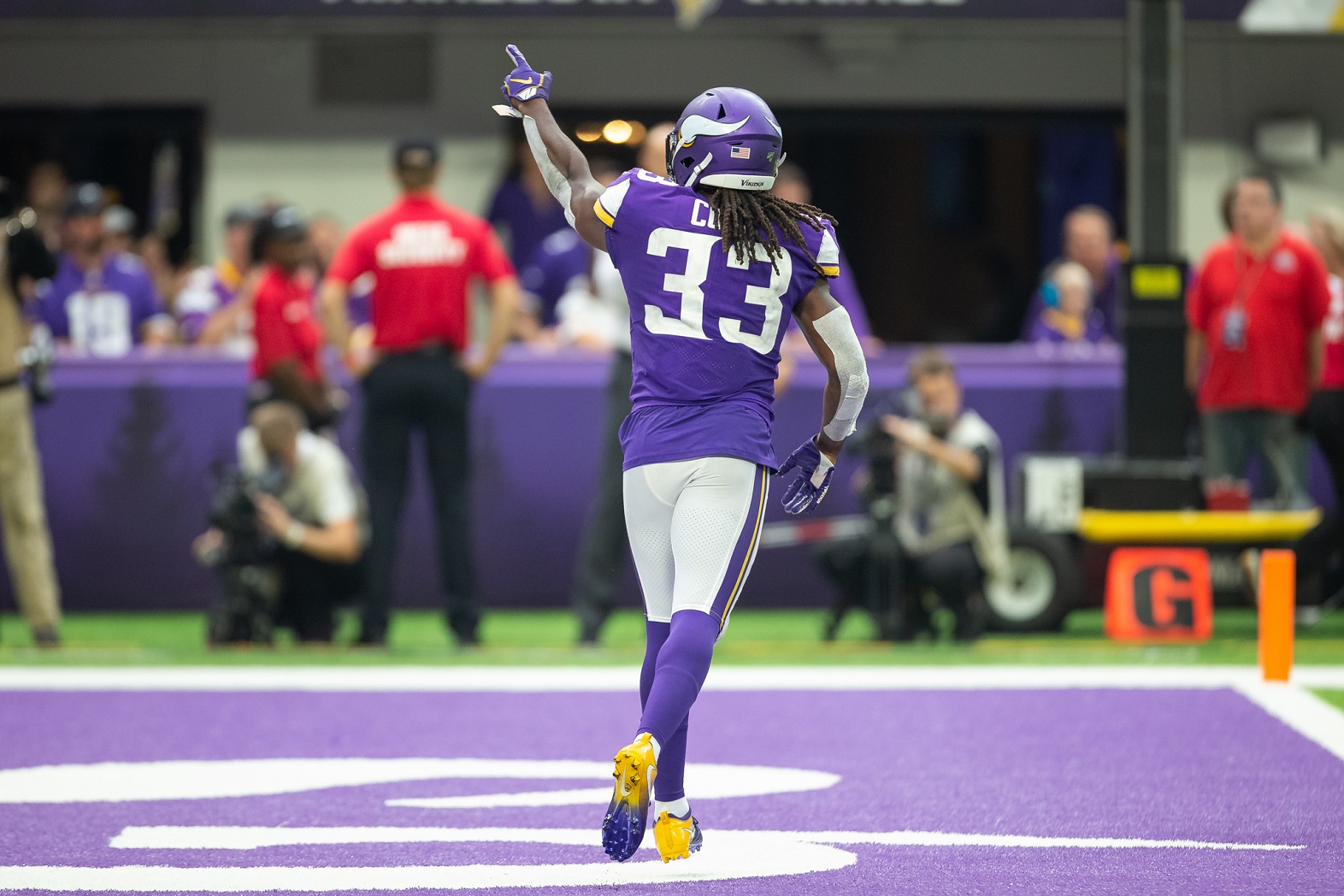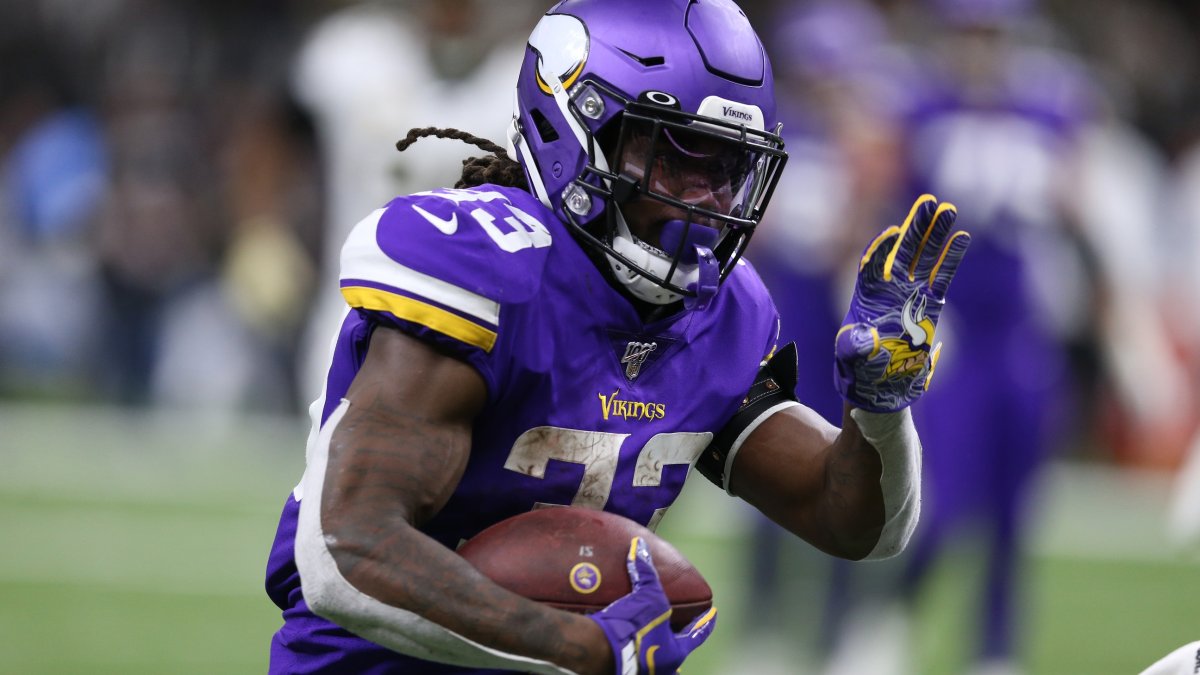Dalvin Cook is the latest talented running back to want a big new contract, but is he worth the investment from the Minnesota Vikings, or would they be wiser to hold firm and be prepared to walk away?
It’s no secret that PFF’s data has been pointing ever more convincingly toward the idea that running backs aren’t worth investing heavily in. And if you’ve read PFF’s piece titled “Why you should never hand out big-money contracts to running backs,” you may be able to put the pieces together and see where this article will ultimately conclude. But let’s play it out with the case study of Cook to see how close he comes to being an exception to the rule.
[Editor’s note: Subscribe to PFF ELITE today to gain access to PFF’s Premium Stats and new Player Grades experience in addition to the 2020 NFL Draft Guide, 2020 Fantasy Rookie Scouting Report, PFF Greenline, all of PFF’s premium article content and more.]
Overall, starting with the premise of “this one is different” is bad process. Much like veteran medical professionals try to teach young doctors to “think horses and not zebras” when they hear hoofbeats in diagnosing patients, we shouldn’t be constantly chasing unicorns when it comes to evaluating running backs. Sooner or later, one will arrive and break every rule in the book as a true exception to the rule, but the road to finding that player will be paved with dozens of regrettable big-money contracts.
Instead, we should start from the standpoint of, “all of the data says not to pay this guy, can we find anything that suggests we should ignore it?”
A cursory glance at Cook’s numbers says no.

Over the past two seasons, Cook has the 15th-best PFF rushing grade (81.3) and is tied for 27th in rushing yards per attempt (4.6). He is also tied for 27th in yards after contact per attempt (3.0), tied for 18th in broken tackle rate (0.19 per attempt) and hasn’t ranked higher than sixth in PFF’s elusive rating in either season.
He’s also raised one of the most feared red flags for a running back — injuries. Cook has yet to complete a full 16-game schedule for the Vikings, coming closest last season when he missed “just” two games. To his credit, his heaviest workload over a season also resulted in by far his highest PFF grade, but that lack of proven durability will be a huge obstacle in the way of him earning a big-money deal independent of his play.
The elusive rating is a critical component in evaluating running back play. One of the biggest obstacles to understanding the value of the position and how replaceable backs are individually is how intertwined their success is with various other aspects of offensive play — from blocking to the success of the passing game and even the personnel packages the team likes to run out of.
Unraveling all of those intertwined factors to separate only the back’s performance is virtually impossible, but the elusive rating makes steps in that direction and is one of the most stable predictors of success we have in our arsenal.
As a data point, it credits the back for broken tackles in both the run and pass game as well as yards after contact, and it looks at them on a per-touch basis to try and see which backs are making plays above and beyond the blocking. In 2019, Cook ranked just 14th, and the year before that, he was sixth — behind players like Nick Chubb and Derrick Henry both years.
As much as we don’t think of the Vikings as having a particularly good offensive line, they have been operating in a scheme that protects them both in pass protection and sets them up for success in the run game. Dalvin Cook has been able to take advantage of that for some good rushing success.
The problem for him is, so has Alexander Mattison.
Mattison averaged the same 4.6 yards per carry last season as Cook did; he generated 3.2 of those yards after contact (compared to Cook’s 3.0), broke tackles at almost the same rate (0.18 per carry compared to 0.19) and gained a first down or touchdown on 19% of his carries compared to Cook’s 21.4%.
Cook’s PFF grade was better (81.3 rushing grade compared to 64.1), but it didn’t translate to better production because that production is so dependent on factors outside of the running back’s control.
Christian McCaffrey has been the most valuable back in football in each of the past two seasons according to PFF WAR, and his contract is the most recent benchmark to chase for any back looking for a new deal, but Cook’s numbers just don’t compare to McCaffrey’s, nor does his value. Cook ranked only eighth in PFF WAR in 2019, behind Austin Ekeler of the Los Angeles Chargers, who signed a much more “reasonable” four-year, $24.5 million contract earlier this offseason.
Guards are often considered among the least valuable players in the league, but Cook’s PFF WAR last season was lower than several of them, including 49ers guard Laken Tomlinson. Effectively, the difference between Cook and a replacement back is lower than any potential upgrade the Vikings could make to their offensive line.
Where Cook might have a legitimate edge over Mattison is in his work as a receiver — the most valuable aspect of running back play in today’s NFL. That’s what makes McCaffrey so special and what makes Ekeler so valuable compared to his rushing production, and Cook is a good receiver out of the backfield even though drops have dragged down his PFF grade.
Cook has 10 drops on just 110 career targets, the average depth of target of which has actually been almost two yards behind the line of scrimmage — that isn’t ideal. But when the ball is in his hands, he has averaged 10.6 yards after the catch, has 21 explosive plays from 93 catches and has moved the chains 40 times. All of his numbers are markedly better than Mattison’s, with the exception of drops (Mattison has yet to drop a pass).
Cook has a top-10 yards per route run figure among all running backs over the past two seasons, though he is almost a full yard behind Ekeler, who leads all backs.
Ultimately, no data point suggests that Cook deserves a contract in the same stratosphere as the one McCaffrey signed, and there's not all that much to argue that he should exceed the deal Ekeler agreed to. Minnesota has already invested in a contingency plan in Mattison, and while you can convincingly argue that Cook is a better player than Mattison in every area, it’s hard to find evidence that it matters or results in vastly different production.
Cook is the latest example of the mounting evidence that running backs simply don’t move the needle when it comes to success at the position, and they remain far more a product of their environment than they are of their own talent advantage over other players.
Dalvin Cook may be as talented as any back in the league, but between his injury history and the data showing the Vikings can insert another back without any significant drop-off, he is the latest example of a player who sadly doesn’t have any leverage in getting paid and needs to rely on the goodwill of the organization to meet him in the middle somewhere.
If Cook wants to play hardball with the Vikings, the team would be best advised to move on, hand the starting job to Mattison and get younger, cheaper and perhaps healthier at the position. The saving will allow a team that was hard up against the cap all offseason to better allocate their limited resources.



 © 2024 PFF - all rights reserved.
© 2024 PFF - all rights reserved.